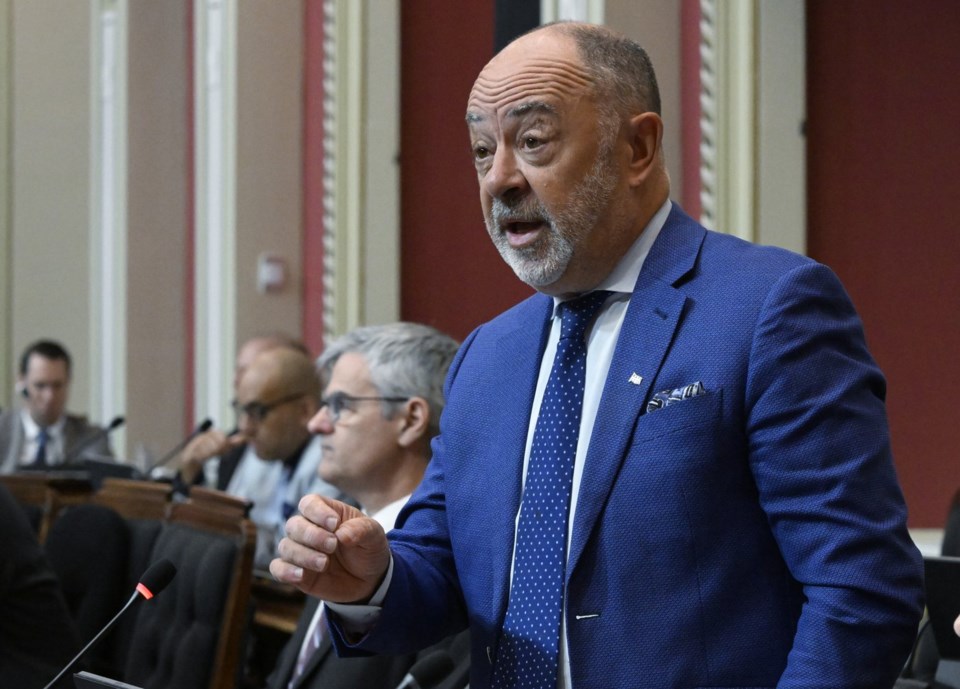MONTREAL — Proposed Quebec legislation to force new doctors to practise in the province's public system for five years after they graduate could potentially violate Charter-guaranteed rights to freedom of movement, a constitutional lawyer said Wednesday.
The bill tabled earlier this week by Health Minister Christian Dubé would require family doctors and medical specialists to sign a contract agreeing to practise in Quebec's public system for the five-year period or else face financial penalties.
"Quebecers understand that we want to strengthen our public system," Dubé told reporters on Tuesday. "I think that it's a minimum to ask students who graduate in medicine, in our major universities, which have an international reputation, in Quebec, to have this obligation."
Constitutional lawyer Frédéric Bérard says the Canadian Charter of Rights and Freedoms guarantees the right of citizens to move to any province to live and work. He said a judge would have to decide whether the threat of hefty fines would amount to violating that right and, if so, whether the violation can be justified.
"The question that will be asked is this one, if I force a student to stay in Quebec with financial penalties, is it a violation of freedom of movement?" he said. "There’s a debate to be had."
He said he doesn't see any constitutional hurdles to forcing new doctors in Quebec to practise in the public system instead of the private one.
However, Section 6 of the Charter guarantees that Canadian citizens and permanent residents have the right "to move to and take up residence in any province" and to "pursue the gaining of a livelihood in any province," with some limitations.
BĂ©rard said a lawyer representing students could argue that the threat of a particularly hefty fine could equal a violation of the right.
"The question will be asked is, is the Quebec government indirectly doing what they’re not allowed to do directly?" he said.
The bill tabled Tuesday, if adopted, would impose fines of $20,000 to $100,000 "per act and per day" for doctors who opt out of the public system before the agreement expires, rising to up to $200,000 for a subsequent violation.
It was not immediately clear if the same amount of fine would apply to a doctor who leaves the province, although the bill was clear that they would face penalties. "This is one of the elements that we want to discuss during the parliamentary committee," a spokesperson for Dubé's office wrote in an email.
While Quebec's opposition parties and a major labour union expressed support for the proposed legislation, the group representing medical residents questioned the legality of some of the rules.
"We will analyze the bill and, in particular, the legality of any discriminatory provision which particularly targets young doctors,” president Ghassen Soufi said in a news release.
Dubé said there would be some exceptions to the bill's requirements, including for doctors who study in Quebec under agreements signed with other provinces. He said he would also listen to different stakeholders in the new year to help determine exactly how, and to whom, the final version of the law will apply.
Quebec Premier François Legault has said his government might invoke the notwithstanding clause to shield the bill from constitutional challenges, but Dubé said Tuesday that he didn't believe it was necessary at this stage.
Bérard, who is also a lecturer at Université de Montréal, said the notwithstanding clause cannot be used to invalidate the section of the Charter that deals with mobility rights.
Dubé's press attaché said government lawyers were consulted on the bill and have deemed it legal.
This report by The Canadian Press was first published Dec. 4, 2024.
Morgan Lowrie, The Canadian Press


